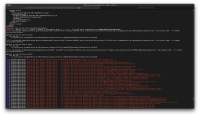-
Bug
-
Resolution: Done
-
Major
-
7.12.0.GA
-
None
-
False
-
False
-
Release Notes
-
-
-
-
-
-
CR1
-
+
-
undefined
-
-
-
-
2022 Week 02-04 (from Jan 10), 2022 Week 05-07 (from Jan 31)
When multiple kie containers (from the same kjar GAV or otherwise) contain DMNs (from the same source .dmn file or otherwise) that evaluate a FEEL expression that includes property access on the same source class, and the respective DMN decisions are evaluated sequentially, the second decision will have 'null' returned from the property access, causing FEEL functions that use that value to fail with "The parameter '<param>', in function <function>, cannot be null". A stack trace is produced in the kie server log, the key parts of which are detailed below.
2021-08-20 12:44:07,912 ERROR [stderr] (default task-2) java.lang.IllegalArgumentException: object is not an instance of declaring class 2021-08-20 12:44:07,912 ERROR [stderr] (default task-2) at java.base/jdk.internal.reflect.NativeMethodAccessorImpl.invoke0(Native Method) 2021-08-20 12:44:07,912 ERROR [stderr] (default task-2) at java.base/jdk.internal.reflect.NativeMethodAccessorImpl.invoke(NativeMethodAccessorImpl.java:62) 2021-08-20 12:44:07,912 ERROR [stderr] (default task-2) at java.base/jdk.internal.reflect.DelegatingMethodAccessorImpl.invoke(DelegatingMethodAccessorImpl.java:43) 2021-08-20 12:44:07,912 ERROR [stderr] (default task-2) at java.base/java.lang.reflect.Method.invoke(Method.java:566) 2021-08-20 12:44:07,913 ERROR [stderr] (default task-2) at deployment.kie-server.war//org.kie.dmn.feel.util.EvalHelper.getDefinedValue(EvalHelper.java:415) 2021-08-20 12:44:07,913 ERROR [stderr] (default task-2) at deployment.kie-server.war//org.kie.dmn.feel.util.EvalHelper.getValue(EvalHelper.java:443) 2021-08-20 12:44:07,913 ERROR [stderr] (default task-2) at deployment.kie-server.war//org.kie.dmn.feel.lang.ast.QualifiedNameNode.evaluate(QualifiedNameNode.java:70) 2021-08-20 12:44:07,913 ERROR [stderr] (default task-2) at deployment.kie-server.war//org.kie.dmn.feel.lang.ast.FunctionInvocationNode.lambda$evaluate$0(FunctionInvocationNode.java:82) [...7 lines of Java streams frames] 2021-08-20 12:44:07,913 ERROR [stderr] (default task-2) at deployment.kie-server.war//org.kie.dmn.feel.lang.ast.FunctionInvocationNode.evaluate(FunctionInvocationNode.java:82) 2021-08-20 12:44:07,913 ERROR [stderr] (default task-2) at deployment.kie-server.war//org.kie.dmn.feel.lang.impl.CompiledExpressionImpl.apply(CompiledExpressionImpl.java:47) [...243 more lines]
I've been able to track this down to the accessorCache in EvalHelper, whose scope is across the whole kie server but the methods it caches come from a classloader associated with a given kie container — thus when the second kie container comes to evaluate the FEEL expression, the cache returns a method that comes from the classloader for the first kie container, which is then evaluated against an object whose type come from the second kie container's classloader.
Here's my more in-depth analysis from our internal documentation of the issue, along with the proposed fix:
This is where it gets fiddly. From what we can tell, the kie server has its own classloader ('ModuleClassLoader for Module "deployment.kie-server.war" from Service Module Loader'), in which EvalHelper lives, plus a class loader for each kie container (kjar deployment) (note, not for each kjar version - two deployments of the same version get their own classloader). This will be to facilitate hot-loading of containers after the kie server is initialised. Thus, the accessorCache field in EvalHelper is shared between all kie containers, but the classes in the classloader for each kie container are unique — for any given class 'com.example.C' (from here sometimes just C) which is used by both kie containers k~1~, k~2~ (with classloaders c~1~, c~2~ respectively), the representation of class C in c~1~ does not equal the representation of class C in c~2~. So when a process p~1~ in container k~1~ evaluates a feel expression containing an object access expression on an object of type C (say, 'c.property'), the appropriate accessor method m~1~ (representing the method 'com.example.C.getProperty()') is stored in the accessorCache map with key "com.example.C.property". When another process p~2~ in container k~2~ evaluates another feel expression containing the same object access expression on an object of type C (again, 'c.property'), EvalHelper consults its accessorCache for methods with the key of "com.example.C.property", it finds method m~1~ — but the current instance of C (from process p~2~) was instantiated by the copy of C from c~2~. When trying to invoke method m~1~ against an instance of C from c~2~, the exception "java.lang.IllegalArgumentException: object is not an instance of declaring class" results.
The proposed fix is to change the key of the 'accessorCache' map to include some unique representation of the classloader from which the method was taken—in the above example, the key would be "<classLoader.getClass().getSimpleName()>@<classloader.hashCode()>.com.example.C.property". Then the method m~1~ has key "<c~1~-classname>@<c~1~-hashcode>.com.example.C.property", and the method m~2~ is added with key "<c~2~-classname>@<c~2~-hashcode>.com.example.C.property" and is not confused with method m~1~.
- clones
-
DROOLS-6571 DMN evaluation errors when the same FEEL object-access invocation is used by two kie containers
-
- Closed
-
